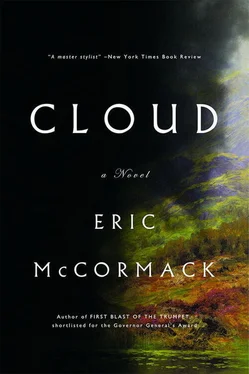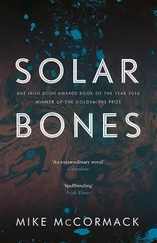I was reluctant, he persistent.
“Once we’re tied up I wouldn’t mind stretching my legs,” he said. “You can come along with me and I’ll show you where the Medical Office is. I visited it when we were here last year. Some of these out-of-the-way places have homegrown cures, so I thought I’d give it a try. Of course, I’d no luck — nothing seems to help this ulcer of mine.” There was a touch of pride in the way he said that.
SO, SHORTLY AFTERWARDS, Pradhan and I walked into the town of Stopover itself, about a quarter mile from the dock. Along the way, we were assaulted by armies of mosquitoes and biting flies enjoying the windless conditions. We swatted at them in vain.
As for the town itself, it was an odd place. It was built in that narrow crack between the huge walls of black rock and seemed to consist of a single street of paintless and weather-beaten clapboard buildings, including a post office, a general store, and a bar. Several ancient-looking passenger cars and trucks were parked on the potholed road. As we walked along, we passed some of the townspeople. The men were all of that burly, short-haired type we’d seen tying up the ship. The women wore black headscarves and baggy dresses with flowery designs. Pradhan observed how, though we surely stood out as strangers, these islanders ignored us, just as they’d paid no attention to the ship’s arrival.
“Now you know quite literally what ‘insular’ means,” he said.
As we walked on, I noticed that the street didn’t have any trees, only a few shrubs and little plots of grass, no bigger than graves, outside some of the clapboard houses.
“The volcanic rock’s just below the surface, so trees can’t take root,” said Pradhan. “Most of the soil here is imported, and sometimes it’s blown away by storms.”
WE EVENTUALLY CAME to the only noteworthy building in town, a cube-shaped structure made of stone blocks and filling an entire corner at the upper west side of the street.
“Here we are,” said Pradhan. “The building’s all that’s left of the old prison. See where the cell blocks were dismantled when it was closed down?” Heaps of rubble stretched over a wide area behind the building. No effort seemed to have been made to remove them.
The heavy wooden front door bore a brass plate:
PRISON MEDICAL OFFICER
DR. MACHLA CHAFAK
“Just give the door a rap,” said Pradhan. “I’ll get on with my walk and see you back at the ship.”
After he left I knocked and a small elderly woman came to the door. She had eyes that were astute but small on either side of quite a large nose. I told her I’d like to see the medical officer.
“I am the medical officer,” she said. “I’m Dr. Chafak.”
Pradhan hadn’t said anything to indicate the medical officer was female. I’d assumed from her appearance that this woman was the maid — she wore one of those baggy dresses like the other townswomen we’d seen. She didn’t, however, wear a headscarf to cover her shoulder-length grey hair.
“Come in,” she said.
I followed her into a large, well-illuminated room. A big window with bars on it looked out onto the ruins we’d seen at the back. The room had a desk, an examination table, various rubber tubes, a sink, and some medicine cabinets — the usual items in a doctor’s consulting room. Usual, but for one thing: an elderly German shepherd lay on a rug in the corner. When I came in, it slowly got up, growling and baring its fangs.
“Pongo! Don’t be silly!” Dr. Chafak said to the dog. “Am I not allowed visitors?” She spoke with an accent similar to that of some of the Eastern European sailors I’d met.
The dog reluctantly crouched back down on the rug and the doctor indicated a chair for me by the examination table. She then put on a white labcoat from a hook on the wall, hung a stethoscope round her neck, and sat in the chair opposite. Now, looking much more the part, she asked me who I was and what was troubling me.
I explained that I was from Scotland, now a deckhand on the Charybdis , that I’d contracted some kind of fever either in or on the way to West Africa, and that although I was feeling much better now I still had occasional headaches.
She took my pulse and checked my back and chest with her stethoscope. She peered into my eyes with another device.
“You do show signs of having had malaria,” she said. “In that case, your symptoms aren’t unusual.” She went to the biggest medicine cabinet, which had shelves of pills and liquids. Then she poured some yellow pills into a paper pillbox and gave them to me. “Take one of these each morning for the next week. That should help clear up the headaches. If they continue, see a doctor at your next port of call.”
I took out my wallet to pay for the medicine.
“No charge,” she said, and before I could thank her, she went on: “By the way, if you don’t mind my saying so, you have a most interesting nose.”
I didn’t know how to respond to that. She’d been looking at my nose all through the examination. She’d even allowed her fingers to touch it gently for no apparent reason.
“The nose is an unjustly neglected area of medical research,” she said. “I had the good fortune to study in Edinburgh under a famous physician — Dr. Cornelius MacVittie?” She was sure someone Scottish, like me, would know the name.
Of course, I’d never heard of him.
“He was renowned for his pioneering work in phrenology— that’s the study of the shape and size of the cranium,” she said. “Dr. MacVittie believed that the human skull can reveal the psyche of its owner. A highly trained phrenologist, like a perceptive art critic, should be able to grasp precisely what the exterior characteristics convey about the inner person.”
She paused a moment, smiling while I took that idea in.
“At the suggestion of Dr. MacVittie,” she said, “I myself moved from the general study of anatomy into phrenology, and from there into a subspecialty: rhinology. That’s the technical name for a specialization in the nose alone. Dr. MacVittie was convinced that through the use of various methods he’d developed, nose studies would inevitably come to replace psychology — which he regarded as a dangerously unscientific discipline.”
As she talked, I couldn’t help but notice again how conspicuous her own nose was. I wondered if it was possible for a rhinologist to do a self-analysis. But I was afraid I might laugh, so I didn’t dare ask.
“Now, in the case of this nose of yours,” she said, “I wonder if you’d allow me to schedule a few sessions to give it a careful examination?”
I told her that wouldn’t be possible, for we sailed the next morning.
“That’s a great pity,” she said. “But if you like, perhaps I could make a few general observations right now — though you mustn’t put too much stock in them. A nose is as individual as a fingerprint, and the nuances are everything. After a rigorous scientific analysis complete with follicle samples I might arrive at quite different conclusions over the course of a few meetings.”
I thought this experience might be amusing, and I was in no rush to get back to the ship. So I told her I’d be most interested in her findings.
“Very well,” she said. “Sit back and relax.”
I did sit back, and Dr. Chafak began to run the tips of her first two fingers along the contours of my nose. Her nails were clean and rounded, her touch delicate. She spoke, almost to herself, as she worked. “Nostrils: medium wide, conducive to adequate inhalation. Bridge: a little on the large side in proportion to cheekbones and brow. Septum: notable deviation from rectilinearity. Skin: tending to desiccation.”
At that point, she stood back for a moment, thinking. Then she took a pencil-thin flashlight from her labcoat pocket. She pushed my head gently back and shone the light up each nostril.
Читать дальше











